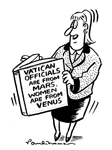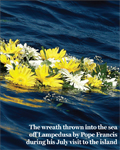The Mediterranean is fast becoming a cemetery, the prime minister of Malta said last weekend after another boat laden with migrants capsized. Here an Italian MP and member of the Sant’Egidio community demands urgent reform to the European policy on migrants and refugees
I had already been to the first aid centre with six other Italian MPs and the President of the House. We had seen 1,025 refugees with only 250 places available. Then we heard the terrible testimony of the capsizing on 3 October of a Europe-bound boat filled with African migrants after it had caught fire. There were more than 500 on board the boat: at that stage we knew only of 151 saved from the wreckage after hours in the water full of petrol, and 111 dead, swamped, whose bodies had been recovered. Four of them were children, among them a newborn baby, still linked to her mother by the umbilical cord.
Then there were the stories: how it took people two months to get to Khartoum, blackmailed by brokers and human traffickers. They would spend a year in Khartoum, as a half-slave, half-beggar, to make money, and there find the traffickers who could help them cross the desert and reach Libya’s capital, Tripoli. The final stage cost US$1,600 per person, for the journey of hope and death, via Misrata on the Libyan coast.
Lampedusa, although Italian soil, is closer to North Africa than the Italian mainland. It has one of the most beautiful beaches in the world but the day following heavy rain, I saw, instead of a holiday-maker’s paradise, a small city of mattresses and red soil, mud and water, with the foam beds soaked and scattered. Here and there were dangling what looked like tin-foil-wrapped Easter eggs – the remains of gold and silver-coloured thermal blankets.
For almost two years, funds allocated by the then Minister of Integration, Andrea Riccardi (also the founder of the St Egidio movement) had not been used to restore the first aid centre or even build a second one. There is no sign either in Lampedusa of the Italian Civil Protection organisation that was so effective in helping people after the tsunami in Sri Lanka and the Abruzzo earthquake – no one had called them.
The European Commission president, José Manuel Barroso, who visited Lampedusa on 9 October with the Italian Prime Minister, Enrico Letta, has pledged €30 million of EU funds to help refugees in Italy. Lampedusa has long been a destination of many refugee boats and the island’s residents have said that the EU has failed to deal with the thousands of migrants who arrive there each year. They cross the Mediterranean to escape crises and war in places such as Somalia, Iraq, Lebanon, Egypt and now Syria.
For years, many cities in northern Italy were no different from those in Europe – their residents’ attitude was “Refugees? Not in my town, please”, while many centres for immigrants in the south went from being full to overcrowded, and eventually uninhabitable. The tensions between north and south have become worse, aggravated by the preaching of hostility to these arrivals by the right-wing Northern League and its allies. Whether the arrivals were asylum seekers, refugees, immigrants, “undocumented” migrants or those fleeing conflict or persecution, they have all been dubbed “illegals”. Unease, fear, distrust, even hatred has been spread against them.
The numbers have steadily increased. The United Nations’ refugee agency, the UNHCR, has estimated that between January and September this year, 30,100 migrants reached Italy from North Africa. The UNHCR has urged Italy to transfer the Lampedusa migrants from the centre there to others in Italy within 48 hours of their arrival. Under the EU’s Dublin II Regulation, anyone seeking asylum has to seek it in the country where they first arrive – and that means Italy for those who arrive in Lampedusa.
So what else can be done? When I asked the Italian Government for a state funeral of the 361 victims, it was so that we could say that those deaths were of members of our family, are “our flesh” as Pope Francis has taught us, and to say that they are part of our European family. This can and must be a turning point. Before his meeting with EU Commission President Barroso, I handed Enrico Letta, the Italian Prime Minister, urgent proposals that I had shared with other political groups in the Italian Parliament, to transform evil into good.
First, we need to empty the Lampedusa centre, refurbish it and begin building a second one. But if we are to prevent human trafficking and more deaths there has to be regular admission of refugees to Europe. The current system, with the EU’s border agency Frontex combating illegal migration, is merely lengthening the illegal routes, increasing the number of deaths and fattening human traffickers. Offices on the southern shore of the Mediterranean, including Italian consulates, EU offices, and embassies in the transit countries of Tunisia and Libya, should be better organised to deal with requests for asylum and international protection. It is time to create a European Immigration Office in North Africa, which would make legal selection possible. People could come by paying a normal fee on a normal ship or ferry boat.
A European welcome office should also be created in Sicily, where people could request asylum and protection in all 28 countries, enabling people to make contact with nations where their relatives already live, while at least half the refugees could still be hosted in Italy. And it is time to create a humanitarian corridor, allowing early identification of the boat-people vessels from Libyan and Tunisian shores, to make effective use of radar tracking and also patrol against traffickers.
The Italian Parliament needs emergency procedures to discuss and approve soon a new law on asylum and citizenship. There is broad consensus on the draft that I submitted at the beginning of the term, based on a modified version of ius soli, giving the temporary right to remain to a child who has at least one parent with the correct papers, and on ius culturae, allowing young people who attend primary school in Italy or who complete a high school or diploma course to remain: it is a way of saying that it is Italian culture and lifestyle that create the “new Italians”.
The time has come for Italy and the rest of Europe to make up its mind: either we decide that Lampedusa is nothing and that we must not change anything – admit that we do not care about Syrian children killed by gas or the thousands of refugees that die in the desert and the Mediterranean – or we decide that we have the spiritual and political energy and courage to create a humane twenty-first century and a world not to be ashamed of.





 Loading ...
Loading ...
What do you think?
You can post as a subscriber user...
User Comments (3)
All this huffing and puffing about an alleged slight and absolutely nothing when Labour refuse to clarify the law on gender based abortion.
Well done Maura. I emailed Tristram Hunt immediately "You should not make assumption that teacher nuns are/were unqualified. Those at my school, Notre Dame Sheffield which I attended from age of 6 to 19 (1946-1959) were university educated and trained teachers. Senior School became a grammar school immediately they were introduced. They ran teacher education colleges. The Notre Dame order was not unique in having teachers with both degrees and teaching qualifications. I also studied at Heythrop College, University of London, where some of the staff were then and are now nuns – with doctorates. You owe a huge apology and I suggest to write to the Catholic Papers humbly admitting you got it horribly wrong and apologising profusely not just making an excuse such as the one on twitter. Ann Lardeur. B.D., M.Th.
I hope he has thoroughly got the message about Notre Dame! fond remembrances.
Sr Maura, your blog is spot on!
So many of today's politicians are ignorant of history.
For my own part, I graduated in 1972 and without any teacher training I was able to gain QTS and commence teaching immediately.
As it happens in mid-career I undertook education training at London Institute of Education and later at Roehampton institute and Open University.
I enjoyed forty years of teaching, including many years in leadership of several Catholic schools. In the several schools in which I studied and later worked I had the advantage of great support of sisters from several congregations. All taught me new lessons of professional dedication and great pastoral commitment.
Thanks be to God for so many great nuns. It was so sad to hear them being criticized by a potential Labour Education Secretary on Question Time.